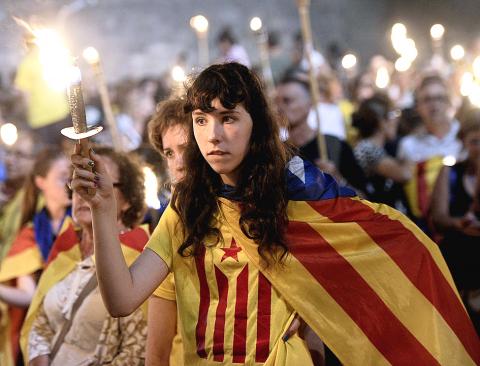Thousands of people in Catalonia were poised to unite yesterday to form a 400km human chain in a bold push for independence from Spain which is fiercely opposed by Madrid. The chain was due to stretch across 86 cities, towns and villages along the coast of the northeastern region on the Mediterranean, passing landmarks such as the Sagrada Familia basilica in Barcelona and the city’s Camp Nou soccer stadium.
The event, tagged the “Catalonian Way Towards Independence,” coincided with the region’s national day, or Diada, which recalls the final defeat of local troops by Spanish king Philip V’s forces in 1714.
“It’s going to be a historic day,” said Carme Forcadell, the president of the Catalonian National Assembly, the grassroots group organizing the human chain. She predicted over 400,000 people would take part.

Photo: AFP
Participants will link arms at 17:14 a reference to the year 1714, which for many Catalonian nationalists marks the beginning of three centuries of oppression by the Spanish state.
The protest is an attempt to emulate the 1989 Baltic Way chain that called for the independence of Estonia, Latvia and Lithuania during the breakup of the Soviet Union.
Hundreds of thousands of people joined in a huge national day rally in Barcelona last year as Catalonian separatist stirrings were stoked by the cuts to health and education services.
Spanish Prime Minister Mariano Rajoy’s right-leaning government refuses to countenance a breakup of Spain, and has vowed to block a referendum on self-rule that Catalonian regional president Artur Mas has promised for next year.
In a sign of its determination, Madrid called on the Constitutional Court to strike down the region’s latest attempt to assert itself: a parliamentary declaration of sovereignty in January.
The court agreed to hear the case, meaning the declaration is suspended until it makes a ruling.
A referendum would be a “unilateral declaration of independence that would have serious consequences for Spain and also for Catalonia” which would have to “bid farewell to the European Union,” Spanish Foreign Minister Jose Manuel Garcia-Margallo said on Tuesday.
On Tuesday evening, however, Mas hit back. Catalonians “must be consulted next year on their political future,” he said.
The road map was clear, he added.
“The right to self-determination, a referendum, national transition and the formation of a state,” should be done “democratically ... peacefully and with broad majorities.”
The Catalonian government wants Spain to follow the example of Britain, which has allowed a referendum on Scottish independence to take place next year. Proud of their distinct Catalan language and culture, yet suffering in Spain’s recession, many of the 7.5 million people in debt-laden Catalonia resent seeing their taxes redistributed to other parts of Spain.
The Catalonian government argues that it receives considerably less per capita public expenditure than the average for all Spanish regions, while contributing much more to the Spanish treasury than most regions.
Catalonia has a jobless rate of 23.85 percent — lower than the national average of 26.26 percent, but still painfully high — and a public debt of 50.9 billion euros (US$67 billion).
The region had to go cap-in-hand to Madrid in January to ask for 9.07 billion euros from a fund to help debt-laden jurisdictions.
About 5,000 volunteers were due to help run the protest. Some 1,500 buses were to help move protesters into position.

The Philippines yesterday said its coast guard would acquire 40 fast patrol craft from France, with plans to deploy some of them in disputed areas of the South China Sea. The deal is the “largest so far single purchase” in Manila’s ongoing effort to modernize its coast guard, with deliveries set to start in four years, Philippine Coast Guard Commandant Admiral Ronnie Gil Gavan told a news conference. He declined to provide specifications for the vessels, which Manila said would cost 25.8 billion pesos (US$440 million), to be funded by development aid from the French government. He said some of the vessels would

Hundreds of thousands of Guyana citizens living at home and abroad would receive a payout of about US$478 each after the country announced it was distributing its “mind-boggling” oil wealth. The grant of 100,000 Guyanese dollars would be available to any citizen of the South American country aged 18 and older with a valid passport or identification card. Guyanese citizens who normally live abroad would be eligible, but must be in Guyana to collect the payment. The payout was originally planned as a 200,000 Guyanese dollar grant for each household in the country, but was reframed after concerns that some citizens, including

Airlines in Australia, Hong Kong, India, Malaysia and Singapore yesterday canceled flights to and from the Indonesian island of Bali, after a nearby volcano catapulted an ash tower into the sky. Australia’s Jetstar, Qantas and Virgin Australia all grounded flights after Mount Lewotobi Laki-Laki on Flores island spewed a 9km tower a day earlier. Malaysia Airlines, AirAsia, India’s IndiGo and Singapore’s Scoot also listed flights as canceled. “Volcanic ash poses a significant threat to safe operations of the aircraft in the vicinity of volcanic clouds,” AirAsia said as it announced several cancelations. Multiple eruptions from the 1,703m twin-peaked volcano in

A plane bringing Israeli soccer supporters home from Amsterdam landed at Israel’s Ben Gurion airport on Friday after a night of violence that Israeli and Dutch officials condemned as “anti-Semitic.” Dutch police said 62 arrests were made in connection with the violence, which erupted after a UEFA Europa League soccer tie between Amsterdam club Ajax and Maccabi Tel Aviv. Israeli flag carrier El Al said it was sending six planes to the Netherlands to bring the fans home, after the first flight carrying evacuees landed on Friday afternoon, the Israeli Airports Authority said. Israeli Prime Minister Benjamin Netanyahu also ordered